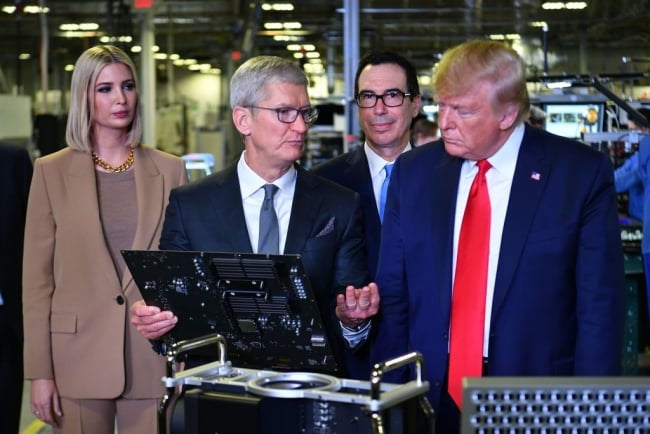You have /5 articles left.
Sign up for a free account or log in.

Ivanka Trump (L) and Tim Cook (2nd L), Apple's CEO, with President Donald Trump (R) in November 2019
Mandel Ngan/AFP via Getty Images
In signing an executive order Friday revamping how the federal government does hiring, President Donald Trump took aim at the necessity of having a college degree.
Trump, in ordering that the government move away from requiring that applicants have degrees, said he wants to make it easier for those without a higher education to get federal jobs.
But higher education leaders said they didn’t take the move as a blow. The government still will want applicants who have the skills they get from going to college.
“I don’t think the federal government is going to start hiring public health specialists without a public health background or engineers without an engineering background,” said Terry Hartle, the American Council on Education’s senior vice president for government and public affairs.
Trump is ordering that the federal personnel management office within six months revise qualifications it requires for jobs with the U.S. government.
A college degree will be required only if mandated by law, or if agencies filling a position believe a college degree is necessary.
Mike Rigas, the acting director of the federal Office of Personnel Management, acknowledged during a briefing with reporters that a degree will still be necessary in some jobs.
But for other jobs, the federal government will no longer disqualify applicants who have the skills for a position because they do not have a degree, a senior administration official told reporters.
Agencies filling jobs will assess the skills of applicants through measures like online tests or involving subject experts in interviewing candidates.
“While education credentials are critical in many lines of work, such as the medical and legal fields, their necessity is far less clear in other areas,” Rigas said.
Administration officials didn’t identify which jobs will no longer require a college education. But the senior official said, for instance, it's unfair that applicants who have a degree, even one unrelated to the job they're applying for, currently are deemed more qualified than another candidate who may have greater skills but no degree.
The move appeared to be a nod to voters without college degrees who strongly supported Trump in his election and are key to his re-election hopes. In making the change, Brooke Rollins, Trump’s acting domestic policy adviser, told reporters that the order will create more job pathways for the two-thirds of Americans who do not have college degrees.
Trump, before signing the order at a meeting Friday of his workforce policy advisory board, said, “The federal government will no longer be narrowly focused on where you went to school but the skill you bring to the job.”
Walter Bumphus, president and CEO of the American Association of Community Colleges, and a member of an Ivanka Trump-led workforce advisory board, which played a role in the order's creation, said in an interview that it won't change the important role community colleges play in teaching skills the federal government will continue to look for in job candidates.
“I don’t see it as skills versus degrees,” he said.
Jay Box, president of the Kentucky Community and Technical College System, and another member of the advisory group, said in an interview the order fits with what community colleges are emphasizing -- working more closely with businesses to identify the skills that are in demand.
Box has urged that community colleges tailor their education to provide businesses with the workers they need more quickly. He said, for example, that colleges should allow students to take their tests and get credentials more quickly than under the traditional semester schedule. Those who want to take more time should be allowed to.
Doing away with the requirement for applicants to have a college degree in more cases will not lessen the value of a degree, he said. “I think we’re years away from businesses saying individuals don’t need college credentials,” he said.
Hartle also didn’t see the order as a blow to higher education. “I don’t think seeking highly skilled people is incompatible with people who have a college degree,” he said.
Hartle also dismissed the notion that the idea is new, saying every president since the 1970s has wanted to reform the civil service. He also doubted that the government will be able to implement the changes by the end of the year, as Trump wants.
“How many job classifications does the federal government have?” he said.
“To do this in six months is like saying you’re going to create the world in seven days,” he said.




